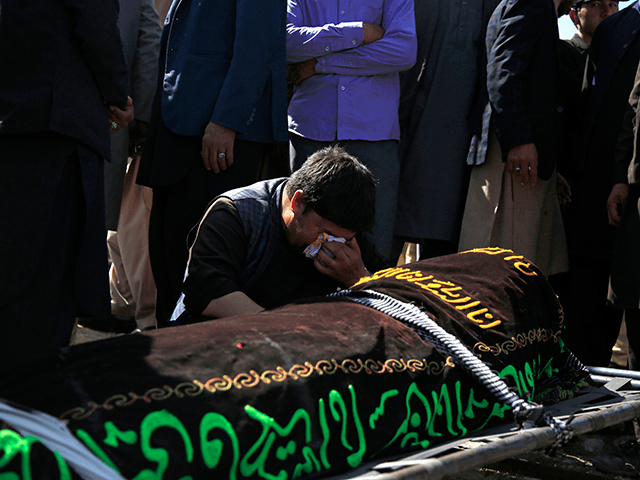A spokesman for the Taliban announced Sunday night the group ordered its forces to pause offensive operations for the three days of Eid al-Fitr, the end of the Muslim holiday of Ramadan.
The announcement came as Afghanistan mourned the murder of at least 85 people at a girls’ school in Kabul, many of them young students. President Ashraf Ghani held the Taliban responsible for the bombing, while the Taliban denied involvement in the attack.
Taliban spokesman Mohammad Naeem said Sunday that Taliban terrorists would observe a ceasefire until the end of Eid, as they have done for most years of their insurgency, unless they were attacked. He added the Taliban would not allow government personnel to visit areas under its control during the holiday.
Dr. Abdullah Abdullah, head of the government’s High Council for National Reconciliation, responded by saying a temporary holiday ceasefire was inadequate and the Taliban should rejoin negotiations to put a lasting end to hostilities. The Taliban withdrew from U.S.-backed peace talks in Turkey last month, ostensibly because they rejected the U.S. vision of power-sharing and democratic elections.
President Ashraf Ghani declared Tuesday will be a national day of mourning for the victims of a car bomb attack on the Sayed al-Shuhada girls’ school in Kabul that killed 85 victims and wounded 150 others.
The death toll continues to rise as remains are uncovered. According to an Afghan official, the primary car bomb – timed to coincide with girls emerging from the school after class, with secondary bombs planted nearby to ensure maximum carnage – was so powerful that some of the victims were effectively vaporized. Anguished families are still frantically searching hospitals in hope of finding their missing children. Injured teenage victims continue succumbing to their injuries in hospitals.
“I think they just don’t want us to study,” a surviving student told CBS News on Monday.
“My classmate died. A few minutes later there was another explosion, and then another. Everyone was screaming and there was blood everywhere,” another told the BBC.
No group has claimed responsibility for the attack as of Monday afternoon. The Taliban denied they were behind the bombing, although the Islamist insurgents have an extensive history of attacking schools and female students because they insist Islamic law forbids education for girls over eight years of age. One of their previous victims, Nobel Prize-winning activist Malala Yousafzai, sent her condolences to Kabul families on Sunday.
The Wall Street Journal noted the school is located in an impoverished district of Kabul called Dasht-e-Barchi whose residents are mostly Hazara, a Shiite religious minority of Central Asian descent targeted by the Islamic State in the past. ISIS has long been fighting both the Afghan government and the Taliban to establish a foothold in Afghanistan.
Afghan President Ashraf Ghani on Saturday blamed the Taliban for the school attack, calling it a “war crime against humanity.” He castigated both the Taliban and ISIS for trying to weaken Afghanistan and deny educational opportunities to its children.
“The Taliban, by escalating their illegitimate war and violence, have once again shown that they are not only reluctant to resolve the current crisis peacefully and fundamentally, but are complicating the situation,” Ghani said.

COMMENTS
Please let us know if you're having issues with commenting.